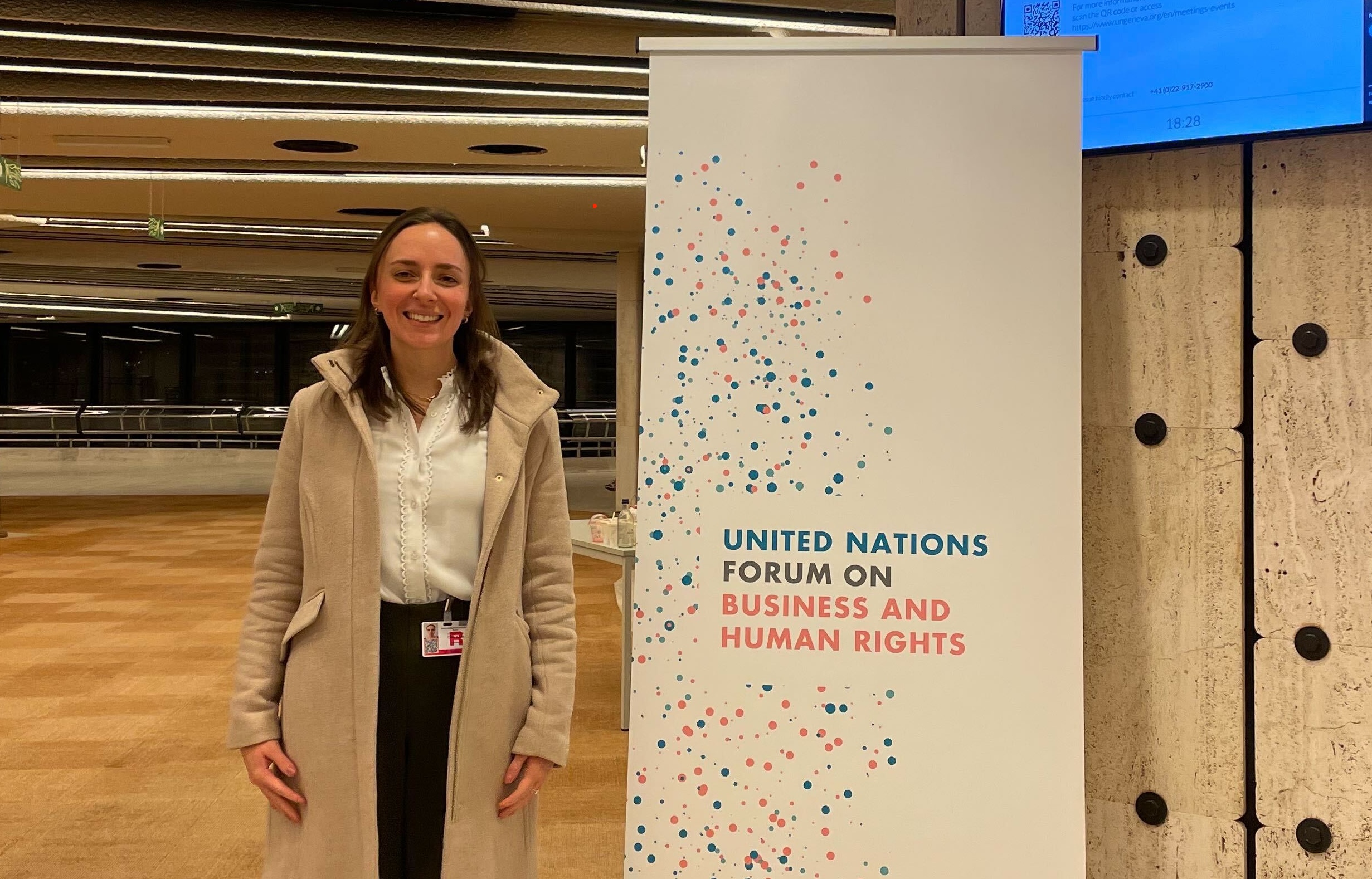12th UN Forum on Business and Human Rights – Day One Recap
November 28, 2023
Blogs
By Claire Kaula
The 12th Business and Human Rights Forum kicked-off the Opening Plenary Session on November 27 with remarks from Gervais Ndihokubwayo (Initiative de Promouvoir de l’éducation des Batwa pour un Développement Durable(IPREBAD)), Allah Dino Khowaja (Secretary, Ministry of Human Rights, Government of Pakistan), Amina J. Mohammed, (Deputy Secretary-General, United Nations), Volker Türk (the United Nations High Commissioner for Human Rights, Celeste Drake (Deputy Director-General, International Labour Organisation), Christine Kaufmann (Chair, OECD Working Party on Responsible Business Conduct), Damilola Olawuyi (Chairperson, Working Group on business and human rights), Edward Kwakwa (Assistant Director General, WIPO), Kimiko Hirata (Executive Director, Climate Integrate), and Lidiane Orestes (DE&I executive manager, Banco de Brasil).
The speakers called to attention the importance of human rights, highlighting that one quarter of the people in the world live in conflict affected areas, a dire situation which has not been the case since the 1940s. With this, the speakers urged to build an economy where rights are respected and businesses operate without harming people and provide effective remedy. Core to achieving this is the guidance from the UNGPs, OECD, and ILO. However, there need to be continued and sustained efforts to move these from paper into practice. Special attention was brought to Indigenous Peoples as they are disproportionally impacted by business operations. Companies need to not only ensure there is access to remedy for Indigenous Peoples but that the remedy is implemented. It was also noted that there needs to be a ‘smart mix’ between companies having the responsibility to respect human rights but also the States having the duty to protect human rights.
Panel: Resilient and Responsible Global Supply Chains: Are Partnerships the Answer?
Moderator: Auret van Heerden (Founder, Equiception)
Speakers: Fernanda Carvalho (Country Director, Brazil, Global Fund to End Modern Slavery (GFEMS)), Sanchita Banerjee Saxena (Senior Advisor, Article One), Dijana Mozina Zupanc (Deputy Ombudsman, Human Rights Ombudsman), Abrar Sayem (Founder & CEO, Merchant Bay), Payal Jain (Head of Social Impact, H&M Group), and Dan Rees (Director, Priority Action Programme on Supply Chains, International Labour Organisation)
Our Article One colleague, Sanchita, along with the other panelists, discussed the importance for companies to build partnerships with their suppliers instead of relying on transactional relationships, as is common. Such partnerships should be ongoing, long-term processes, include transparent sharing of information, be built collaboratively, and have a focus on remedy. Companies and suppliers should work together to find solutions which are feasible and can be put into practice. This includes listening to each other and mutually agreeing on the solutions.
Key Takeaways for Companies:
- Ensure human rights expectations are not simply placed onto suppliers but instead build long-term collaborative partnerships with suppliers.
- Implement due diligence through shared responsibility with suppliers.
- Ensure transparent sharing of information when working with suppliers.
Panel: Defining the Rules of the Game: Regulating Lobbying to Ensure Responsible Corporate Political Engagement
Moderator: Fernanda Hopenhaym (Member, UN Working Group on Business and Human Rights)
Speakers: Sor.Rattanamanee Polkla (Executive Coordinator, Community Resource Centre), Elissandra Costa (Senior Project Lead, EIRIS Foundation), Anita Ramasastry (Special Repesentaitive to Chair on Combatting Corruption, OSCE), Bart Devos (Vice President of Public Policy, Responsible Business Alliance), and Francisco Javier Leturia Infante (Chief of Cabinet, Consejo para la Tranparancia)
The panelists presented that companies engaging in lobbying should be conducting human rights due diligence, as is the case with any other company action. Lobbying in itself is neither good nor bad, but companies should make the public aware of what lobbying they are engaging in, with whom, as well as the positions they are taking. In practice the panelists regularly observe that companies’ lobbying efforts are contradictory with their public human rights commitment.
Key Takeaways for Companies:
- Be transparent about what lobbying the company is conducting and what positions are being taken.
- Ensure the company’s human rights policy and strategy applies to the company’s lobbying work.
- When lobbying is taking place, review a company’s lobbying strategy to ensure it aligns with the company’s human rights policy and strategy.
Panel: Just Transition in Energy and Extractives Industries
Moderator: Yayoi Fujita Lagerqvist (Program Officer, Swedwatch)
Speakers: Justine Nolan (Director, Australian Institute for Human Rights, UNSW Sydney), Innocence Ntap N’diaye (President, Haut Conseil du Dialogue Social du Sénégal), Alancay Morales Garro (Lead on Business and Human Rights, Indigenous Peoples Rights International), Damilola Olawuyi (Chairperson, Working Group on business and human rights), Muhammad Al Amin (Executive Director, WALHI South Sulawesi), and Joel Frijhoff (Sustainable Supply Chain Manager, Orsted).
The panel highlighted that for a just transition to be truly ‘just’ it must align with human rights. Without doing so, the renewable energy transitions, especially due to increased mineral mining, will replicate human rights abuses and also create new ones. A large portion of transition minerals are on, or adjacent to, Indigenous Peoples land. Therefore, it is critical to implement a rights-based due diligence approach to respect Indigenous Peoples’ rights. There are good examples from the US and Canada that can be scaled up.
Many of the panelists agree that while the transition to net zero carbon economies is important, it may not be used as a justification for human rights abuses.
Key Takeaways for Companies:
- Ensure just transitions policies and programs align with human rights.
- Assess human rights risks in the complete mineral and metals supply chain. This includes going beyond 3TGs and assessing other minerals and metals required for a renewable energy transition, such as cobalt and lithium.
- Consider the collective and individual rights of Indigenous Peoples and human rights defenders in just transition policies and plans.
- Ensure a participatory process is conducted with local communities, especially in the extractives industry.
For more information on how to incorporate human rights into your business strategy contact Article One at hello@articloneadvisors.com. If you are interested in the full recording of the panels, please access them on the UN website here.
